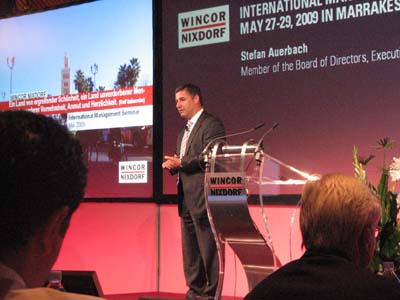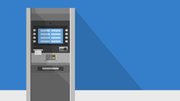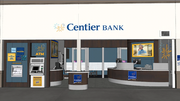Article
Reaching the unbanked in Africa through the ATM, mobile channels
Wincor Nixdorf, which dominates the ATM market in Morocco, says efforts to reach unbanked users throughout Africa will begin in the continent's most developed ATM market.

June 2, 2009 by Tracy Kitten — Editor, AMC
See aslide showfrom the event.
In Africa, markets vary by country, and so do banking practices. A lack of reliable telecommunication infrastructures, coupled with longstanding concerns about the stability of banks and the financial sector generally, have all played roles in keeping many of Africa's inhabitants unbanked and underserved.That soon is expected to change, as global banking houses move in and governmental intervention works to stabilize the economies of Africa's various markets.
The road to fully banked societies, however, will be a long one.
 |
Stefan Auerbach, executive vice president of Wincor Nixdorf's banking division, welcomes the audience to the symposium on opening day. |
The stability of Africa and the impact its financial uplift will have on the rest of the world, especially European banks and financial-services providers, was the focus of last week's International Management Seminar, hosted by Paderborn, Germany-based Wincor Nixdorf International in Marrakech, Morocco.
The symposium, which brought in some 150 attendees from 27 countries, touched on everything from economic deregulation to mobile banking. Wincor Nixdorf chief executive Eckard Heidloff says his company sees Africa as being a strategic market — one in which Wincor is building a foundation for growth.
"We believe the culture of the countries in Africa differs from country to country, and so we are committed to having a presence in each individual market, where we can give a specialized approach to the needs of that market," Heidloff said. "And this offers a chance for us to grow the software and services side of our business. We see 2009-2010 as being critical years for banking growth in Africa."
Those critical years for growth will see a strong influx of ATM placements, Heidloff says, with an initial focus on more advanced markets, such as Morocco. From there, Nigeria and Tanzania will likely be next, as larger FIs move into those markets.
"In Morocco, we have had very good progression. We don't have relationships with other markets and countries like we do here, and that has really benefited our strength in Morocco," Heidloff said. "This is important to us, because we see Morocco as a gateway to Africa."
Of Morocco's 3,629 ATMs, 3,200 are Wincor Nixdorf machines.
Telecommunications: A hurdle
One hindrance to growth has been Africa's network and telecommunications infrastructures, or lack thereof. For the market to improve financially, mobile banking is expected to play a key role — but it won't trump the ATM, say Wincor executives.
"In Africa, we are just beginning to build the infrastructure, we are starting with ATMs," Heidloff said. "Telecommunications is another problem. So we will work to move repetitive transactions from the branch to the ATM, and then we will begin moving more transactions to the mobile channel. We will gradually work to move customers to newer technology, but it won't happen all at once, and we don't see it being just the ATM or just the mobile channel. We don't see competition between the two. We see both channels being important, as more consumers in Africa move to become banked customers."
In Morocco, the process of moving unbanked and underbanked users to banked customers will be more progressive. In other parts of Africa, namely Nigeria and Libya, progress will be more gradual.
Heidloff says Wincor's ATM position in Africa is No. 1 or 2. The company holds 85 percent of the ATM market and 60 percent of the bank-branch market in Morocco. Given the company's strong position in Morocco, coupled with its interest in branching out more deeply into other African markets, Heidloff says Wincor is considering Morocco as a site for a research and development center.
Deposit automation and moving the unbanked to banked
Automated deposits are revolutionizing ATM transactions around the world. In Africa, the ability to make cash deposits at ATMs in bank branches is expected to bring more consumers into the banking fold. By learning from the examples set in other markets, banks in Africa are encouraging stronger card penetration and are building stronger branch networks.
Italy's BNL, which is part of the banking conglomerate BNP Paribas Group, is setting a global standard for branch optimization through automated deposits. During the management seminar, the bank's head of branch development and innovation for BNL, Alberto Planta, said BNL is now the European leader in deposits, with a total of €540 billion annually.
Through deposit automation and branch optimization, the bank has improved customer retention and profitability.
"In 2006, we were losing customers," Planta said. "Today, we are gaining customers and increasing our pretax income."
The ATM and Internet are the bank's primary channels for cash withdrawals, deposits and flow.
"In 2007, we began testing several multifunction ATMs. Today, we have more than 380 multifunction, deposit-taking ATMs in our branches, and all of them run multivendor software," Planta said. "We are steadily increasing the migration of deposits from the teller to the ATM in our older branches for checks and cash."
By the end of June 2009, the bank expects all of its ATMs to accept cash and checks. And within three years, all of the bank's new branches are expected to be fully automated — meaning they only will offer self-service.
The message for other markets, Planta says, is that ATMs with automated-deposit functionality are built to offer a range of additional services, including money transfer, bill-payment, etc. They are multifunctional machines that can offer services aimed at pulling unbanked consumers into the bank branch.
For Morocco, that message is key, says Rachida Benabdallah, who, as the general manager of Morocco's Centre Monetique Interbancaire, oversees all electronic-banking transactions for the country's payments system.
From 2005 to 2007, Morocco's consumer loans increased 27 percent. The annual net income of the country's 16 banks continues to increase by 10 percent. From 2007 to 2008, Morocco's number of bank branches increased 12 percent, and it now totals 2,748 branches. And though the country only has 1 ATM per 10,900 people, its banked growth rate among Morocco's inhabitants has continued to rise from 2003 to 2007.
Now, Benabdallah says, the country wants to encourage stronger use of debit and credit, not only among consumers, but also amidst the retail sector.
In Morocco today, cash use prevails. Few merchants in the medina (center city) accept credit or debit, and exchange fees can be high. Since 2004, when the country passed numerous reforms to encourage more e-banking, the doors began to open for a stronger payments infrastructure, Benabdallah says. But the country still has a long way to go.
"The impact of the financial crisis has slowed some progress in Morocco, since the amount of money coming into the banking system from Moroccans living abroad has slowed," she said. "But we see that as having a limited risk, given the low level of commitment our economy has on foreign currency."
At the end of 2007, Morocco set up a secure Internet bank card; in 2008, the country initiated mobile-phone top-ups at ATMs; and most recently Morocco has set up a certified Visa and MasterCard program for EPPs at ATMs and POS devices to bring the country into the EMV compliance fold. EMV smart cards are also now being issued in the country.
All of this is expected to assist the migration of unbanked users to banked customers, and to encourage stronger use of plastic.
"Today our country has 4 million payment cards," Benabdallah said. "That's a 27-percent increase since 2004. Electronic banking can benefit the socioeconomic development of the country, and modernization of the economy benefits everyone."
ATM ManagementTrends / StatisticsDebit / CreditPublic CompaniesDepositsUnderbanked / UnbankedBranch TransformationInnovationWincor Nixdorf International
 ChatGPT
ChatGPT Grok
Grok Perplexity
Perplexity Claude
Claude












